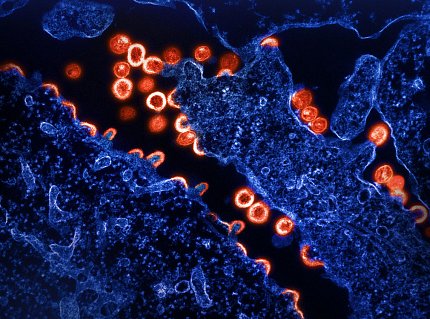NIH-Developed HIV Antibodies Protect Animals in Study

Photo: NIAID
Three different HIV antibodies each independently protected monkeys from acquiring simian-HIV (SHIV) in a placebo-controlled proof-of-concept study intended to inform development of a preventive HIV vaccine for people. The antibodies—a human broadly neutralizing antibody and two antibodies isolated from previously vaccinated monkeys—target the fusion peptide, a site on an HIV surface protein that helps the virus fuse with and enter cells.
The study, published in Science Translational Medicine, was led by NIAID’s Vaccine Research Center (VRC).
Antibodies that target the fusion peptide can neutralize diverse strains of HIV in vitro, that is, in a test tube or culture dish outside of a living organism. The VRC isolated a fusion peptide-directed human antibody, called VRC34.01, from a person living with HIV who donated blood samples for research. Researchers also isolated two antibodies from rhesus macaques—a species of monkey with immune systems similar to humans—who previously had received a vaccine regimen designed to generate fusion peptide-directed antibodies.
The three antibodies studied each provided statistically significant protection from SHIV, and the effect was dose dependent, that is, highest in monkeys with greater antibody concentrations in their blood.
The study authors conclude that an effective HIV vaccine targeting the HIV fusion peptide likely will need to expand upon the concepts used in this study, by generating multiple varieties of fusion peptide-directed antibodies. This would increase the likelihood that the vaccine could maintain a preventive effect across the vastly diverse HIV variants in circulation.
